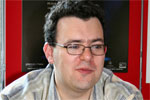


ChessBase 17 - Mega package - Edition 2024
It is the program of choice for anyone who loves the game and wants to know more about it. Start your personal success story with ChessBase and enjoy the game even more.
Dennis Monokroussos writes:
The city of Baku, Azerbaijan, seems almost a factory for great chess players. Garry Kasparov, Teimour Radjabov, Shakhriyar Mamedyarov, Vugar Gashimov, Vladimir Akopian, and the star of today's show, Emil Sutovsky. While he's a bit lower-profile than most of the other Baku natives these days, the Israeli transplant has had a career almost everyone – including almost every GM – would be proud of: grandmaster, former world junior champion, former European champion, winner of nearly 40 international tournaments and a career peak rating of 2697.
Further, it's not only his results that have been exceptional; he is renowned for playing beautiful attacking games. Perhaps his greatest game so far came against Ilya Smirin, from the 2002 Israel Championship. Smirin, himself a great player (a few months before this game he was over 2700), played a novelty in an anti-anti-Sveshnikov variation, but Sutovsky was either better prepared or experienced some over-the-board inspiration. Whatever the story, this week's hero devised a real two piece sacrifice that gave him enduring attacking chances, but nothing that could be calculated to a finish in advance. Sutovsky's idea proved absolutely correct, and after a number of accurate building moves, he finished the job with a beautiful final blow. All in all, a masterpiece in miniature.
It's a game worth seeing, and watching the show this Wednesday night at 9 p.m. ET is a great way to pass the time between the just-finished FIDE Grand Prix (in Baku!) and the pending MTel Masters. The show is free and directions can be found here. Hope to see you then!
Dennis Monokroussos' Radio ChessBase lectures begin on Wednesdays at 9 p.m. EST, which translates to 02:00h GMT, 03:00 Paris/Berlin, 13:00h Sydney (on Thursday). Other time zones can be found at the bottom of this page. You can use Fritz or any Fritz-compatible program (Shredder, Junior, Tiger, Hiarcs) to follow the lectures, or download a free trial client. |
You can find the exact times for different locations in the world at World Time and Date. Exact times for most larger cities are here. And you can watch older lectures by Dennis Monokroussos offline in the Chess Media System room of Playchess:

Enter the above archive room and click on "Games" to see the lectures. The lectures, which can go for an hour or more, will cost you between one and two ducats. That is the equivalent of 10-20 Euro cents (14-28 US cents).
 Monokroussos in Mexico: World Championship 2007 |
Dennis Monokroussos is 41, lives in South Bend, IN, where he teaches chess and occasionally works as an adjunct professor of philosophy at the University of Notre Dame and Indiana University-South Bend.
At one time he was one of the strongest juniors in the U.S. and has reached a peak rating of 2434 USCF, but several long breaks from tournament play have made him rusty. He is now resuming tournament chess in earnest, hoping to reach new heights.
Dennis has been working as a chess teacher for ten years now, giving lessons to adults and kids both in person and on the internet, worked for a number of years for New York’s Chess In The Schools program, where he was one of the coaches of the 1997-8 US K-8 championship team from the Bronx, and was very active in working with many of CITS’s most talented juniors.
When Dennis Monokroussos presents a game, there are usually two main areas of focus: the opening-to-middlegame transition and the key moments of the middlegame (or endgame, when applicable). With respect to the latter, he attempts to present some serious analysis culled from his best sources (both text and database), which he has checked with his own efforts and then double-checked with his chess software.